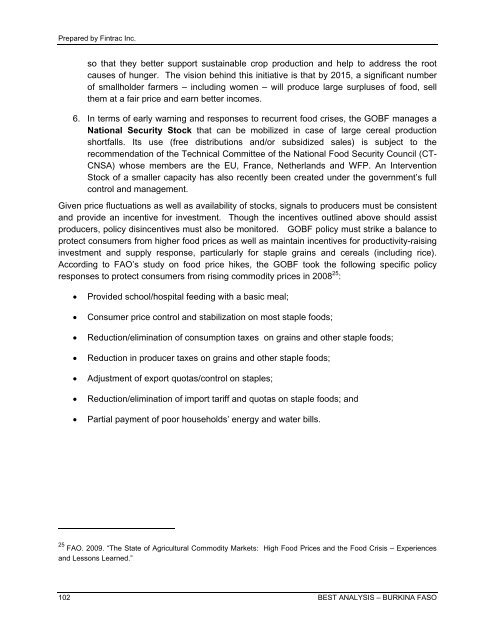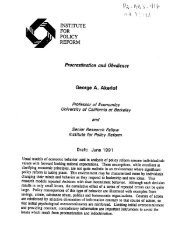USAID Office of Food for Peace Burkina Faso Bellmon ... - CiteSeerX
USAID Office of Food for Peace Burkina Faso Bellmon ... - CiteSeerX
USAID Office of Food for Peace Burkina Faso Bellmon ... - CiteSeerX
You also want an ePaper? Increase the reach of your titles
YUMPU automatically turns print PDFs into web optimized ePapers that Google loves.
Prepared by Fintrac Inc.<br />
•<br />
•<br />
•<br />
•<br />
•<br />
•<br />
•<br />
so that they better support sustainable crop production and help to address the root<br />
causes <strong>of</strong> hunger. The vision behind this initiative is that by 2015, a significant number<br />
<strong>of</strong> smallholder farmers – including women – will produce large surpluses <strong>of</strong> food, sell<br />
them at a fair price and earn better incomes.<br />
6. In terms <strong>of</strong> early warning and responses to recurrent food crises, the GOBF manages a<br />
National Security Stock that can be mobilized in case <strong>of</strong> large cereal production<br />
shortfalls. Its use (free distributions and/or subsidized sales) is subject to the<br />
recommendation <strong>of</strong> the Technical Committee <strong>of</strong> the National <strong>Food</strong> Security Council (CT-<br />
CNSA) whose members are the EU, France, Netherlands and WFP. An Intervention<br />
Stock <strong>of</strong> a smaller capacity has also recently been created under the government’s full<br />
control and management.<br />
Given price fluctuations as well as availability <strong>of</strong> stocks, signals to producers must be consistent<br />
and provide an incentive <strong>for</strong> investment. Though the incentives outlined above should assist<br />
producers, policy disincentives must also be monitored. GOBF policy must strike a balance to<br />
protect consumers from higher food prices as well as maintain incentives <strong>for</strong> productivity-raising<br />
investment and supply response, particularly <strong>for</strong> staple grains and cereals (including rice).<br />
According to FAO’s study on food price hikes, the GOBF took the following specific policy<br />
25<br />
responses to protect consumers from rising commodity prices in 2008 :<br />
Provided school/hospital feeding with a basic meal;<br />
Consumer price control and stabilization on most staple foods;<br />
Reduction/elimination <strong>of</strong> consumption taxes on grains and other staple foods;<br />
Reduction in producer taxes on grains and other staple foods;<br />
Adjustment <strong>of</strong> export quotas/control on staples;<br />
Reduction/elimination <strong>of</strong> import tariff and quotas on staple foods; and<br />
Partial payment <strong>of</strong> poor households’ energy and water bills.<br />
25 FAO. 2009. “The State <strong>of</strong> Agricultural Commodity Markets: High <strong>Food</strong> Prices and the <strong>Food</strong> Crisis – Experiences<br />
and Lessons Learned.”<br />
102 BEST ANALYSIS – BURKINA FASO

















